
AML due diligence: Tracking the good, the bad before it turns ugly
As the ways and means of hiding dirty money rise, banks, MAS and law enforcement must keep up.
The United Nations Office on Drugs and Crime estimates that the global economy is losing $3-5 trillion every year to financial crime but only 1% of illegal gains are frozen or seized by the authorities.
Due to its important strategic location for transnational shipments, Singapore is becoming a clear target for criminals. The use of shell companies is on the rise as Singapore nationals are targeted by crime lords setting up fake businesses in order to launder dirty money. The city is also seeing an upsurge in money mules, with an ongoing police probe on 128 suspected individuals, some as young as 15 years old.
This concerning situation has prompted the Monetary Authority of Singapore to closely work with banks to proactively monitor shell companies that can be exploited for illegal financing. However, this is hindered by the use of legacy, disparate systems and fragmented and manual processes that do not provide enough essential visibility.
Bottomline Technologies, an innovative payment processing company, works closely with private and corporate banks who bear the brunt of illicit activities by providing a single unified view of customer and transaction activity through its suite of Fraud, AML and Sanctions solutions.
“Crime is converging. Nowadays, cyber criminals are also involved in fraud, money laundering, and illicit trafficking,” said James Richardson, Head of Market Development, Risk and Fraud at Bottomline. “Systems must be able to detect multiple risks at both a customer and transaction level. However, this is challenging when there is a lack of connectivity and communication—either between multiple systems or many standalone systems.”
He expressed that banks need to implement controls across the customer and payment lifecycle. For instance, banks can enhance their know your customer (KYC) controls to identify and verify the customer’s source of wealth or funds, verify beneficial owners, and perform checks against adverse media, watch lists, politically exposed persons (PEPs), and sanctions.
At the same time, banks should be able to properly profile, screen and monitor the transactions that the customers are making; systems must be able to detect whether these transactions match the profile of a certain customer. What does a good versus a bad transaction look like? What is the quality of data in the transaction? Is the originator missing? Are dummy or meaningless terms used to disguise the beneficiary? Is the customer structuring the payment? Has a dormant account suddenly been activated? Is there a sanctions risk?
The type of careful scrutiny needed to answer these questions may seem like a job for law enforcement intelligence agencies, but through intelligent tools and technology, Bottomline is empowering its business clients to tackle financial crime.
In one instance, the company was approached by a private bank to consolidate their lines of defense and implement an end-to-end KYC, AML and Sanctions process that could identify customer and transaction risk.
“The customer consolidated three systems into one and used Bottomline across three lines of defense to proactively manage risks: front office, compliance and audit. In 12 months, the bank saw an improved customer experience while working collectively to reduce money laundering risks. Using a single system for KYC, AML and sanctions screening has helped to detect and mitigate financial crime risks,” explained Sukh.
As small and large banks make the due diligence of upgrading their outdated AML systems criminals continue to come up with new schemes to clear their proceeds, with some already gaining new ground by using virtual assets. Companies like Bottomline offer simple, smart and secure solutions that have become even more necessary as regulators look for all the help they can get to track these fraudsters and safeguard the economy.
Last year saw a former prime minister put on trial for allegedly receiving US$1b of laundered money into his account. In one of the region’s largest corporate scandals, US$4.5b from Malaysia’s state fund was siphoned through shell corporations in Saudi and Malaysia, and large corporate US banks and Swiss private banks in Singapore foreclosed by MAS.
Millions of dollars have already been returned, but authorities from Malaysia, Singapore and US are still searching for the infamous “Jho Low” who authorities say is in the middle of it all. Are you willing to risk your reputation for such persons of interest? That’s something only your AML system could answer.
Click here to read more about Bottomline AML & Sanctions and download the whitepaper, Navigating the Challenges Around AML & Sanctions.






















 Advertise
Advertise








